In January 2019, Andre Braugher sat for an interview with the Village Green in Dressing Room #1 of the South Orange Performing Arts Center where he discussed “Tell Them I’m Still Young,” the world-premiere of a new play he was starring in for the American Theater Group. Effortlessly genial, Braugher remarked how happy he was to have a five-minute commute to rehearsal. A resident of South Orange for almost 25 years, he also said he enjoyed the opportunity to perform theater in his adopted town, even if it was just for a few weeks.
His 2019 performance at SOPAC turned out to be one of his last theater performances – and the last time that he would showcase his immense talents so close to home. On December 11, 2023, Braugher died only months after he was diagnosed with lung cancer.
Andre Keith Braugher was born in Chicago on July 1, 1962 and grew up in the Austin neighborhood on Chicago’s West Side. In a 2014 interview with the New York Times, he said: “We lived in a ghetto. I could have pretended I was hard or tough and not a square. I wound up not getting in trouble. I don’t consider myself to be especially wise, but I will say that it’s pretty clear that some people want to get out and some people don’t. I wanted out.”
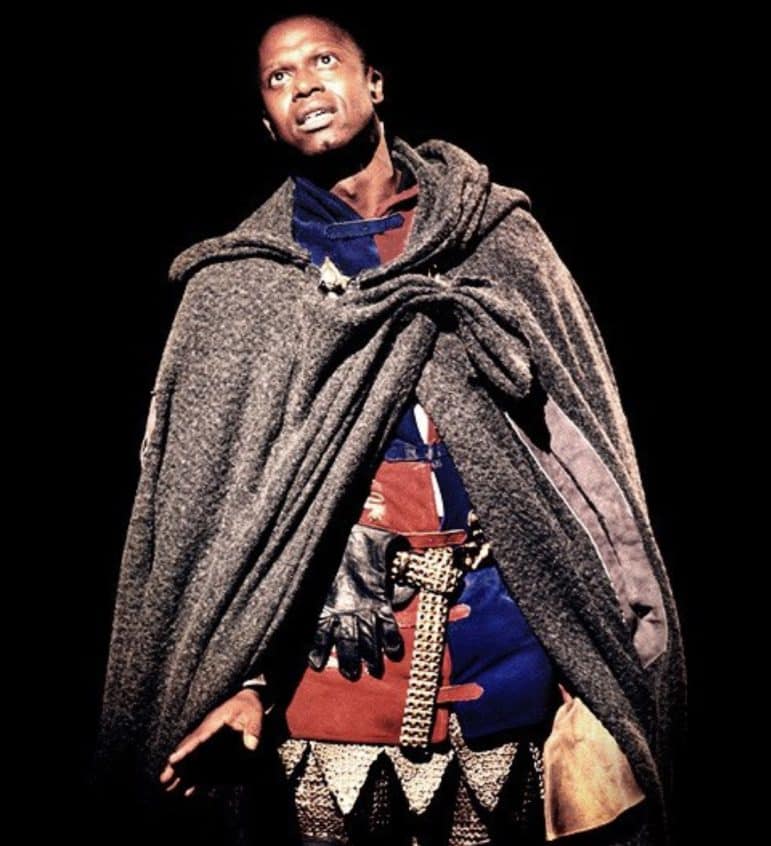
Andre Braugher performed the titular role in Shakespeare’s “Henry V” in 1996.
Braugher received a scholarship to Stanford University where he fell in love with theater. He solidified his commitment to the craft when he acted in a production of “Hamlet.” He credits Shakespeare’s work as a deep inspiration.
Braugher told the New York Times that he wanted to save “Pericles, Prince of Tyre” to perform later in career. “I’ve never read it because I’d like to see one Shakespeare play that I don’t know what happens,” Braugher said. “I close my ears and hum whenever I hear anything about ‘Pericles, Prince of Tyre.’ ”
After graduating from Stanford in 1984, Braugher studied at Juilliard, where he honed his skills as a stage actor. While his most well-known roles may have been on the small screen, his roots remained firmly in the theater. His first professional theater job was in Shakespeare’s “Coriolanus” at the Public Theater, which starred Christopher Walken and Irene Worth. In 1996, he played the titular role in “Henry V” – a role which earned him his first Obie Award. Braugher refers to the Public Theater as a “saving grace” because of their color-blind casting. He estimates that he acted in over a dozen productions there.
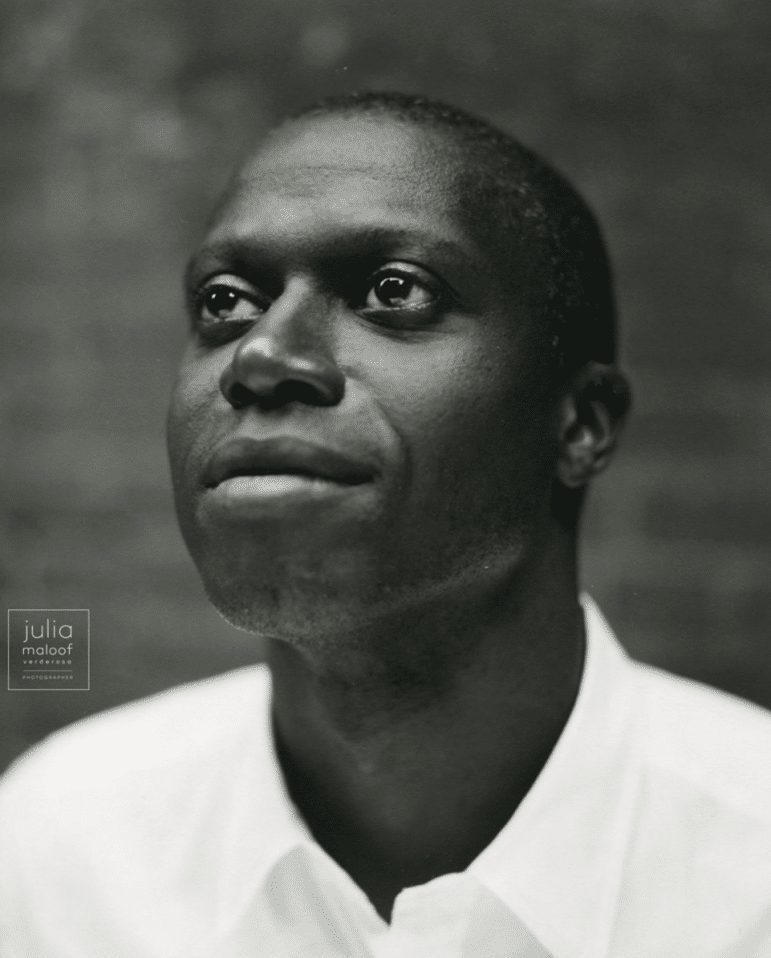
Andre Braugher as Henry V at the Delacourt theater, 1996 for TimeOut London (credit Julia Verderosa)
“I had the privilege, the honor, of directing Andre as Claudius in ‘Hamlet’ 15 years ago, and I will never forget his meticulous work ethic and his abiding kindness to me, making my Delacorte debut and nervous as I could be,” said Oskar Eustis, the Artistic Director at the Public Theater in New York City. I will miss him enormously, while remaining deeply grateful for what he gave to me, and to all of us.”
Just a year after graduating from Juilliard, Braugher played the supporting role of Corporal Thomas Searles in the 1989 film “Glory” which told the story of the 54th Regiment, an infantry unit made up of all Black soldiers during the Civil War. He acted alongside Morgan Freeman, Denzel Washington, and Matthew Broderick.
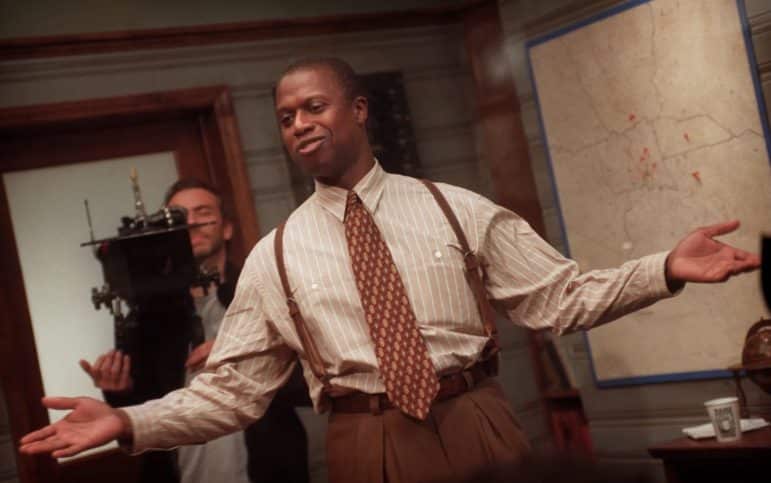
Braugher as Detective Frank Pembleton in Homicide: Life on the Street
But it was the gritty TV series “Homicide: Life on the Street” (1993-1998) which won him major critical acclaim and introduced him to an even wider audience. Braugher played the role of Frank Pembleton, a detective who relocated from New York City to the Baltimore Police Department because he believed he would not be able to advance his career with the NYPD.
In performing Pembleton, Braugher created a complicated, confident, pained, firebrand – well known for getting confessions from suspects in “The Box” – the homicide department’s interrogation room. Pembleton would shift between moments of intimately coaxing the truth to a wildly intimidating interrogator.
In the first season of the series, the episode “Three Men and Adena” includes Braugher’s Pembleton and his partner Detective Tim Bayliss (Kyle Secor) attempting to get a confession from Risley Tucker (Moses Gunn), accused of murdering an 11-year-old girl. “We performed it like a theater piece,” Braugher told the New York Times. “There’s nowhere to go. It’s a strangely shaped little room with a door and a window. So it’s just three men going around and around and around again. […] It’s the most fun I’ve had filming an episode. It was physically hard, it was emotionally taxing, but it was very satisfying.”
Braugher’s experience during the “Homicide” series was also notable on a personal level. Mary Pembleton, his fictional wife in the series was played by the actress Ami Brabson, Braugher’s wife in real life. The scenes between the two explored the complications of family life for a detective obsessed with solving crimes causing immense strife with his fictional wife and their child. The couple were married for 32 years until Braugher’s death.
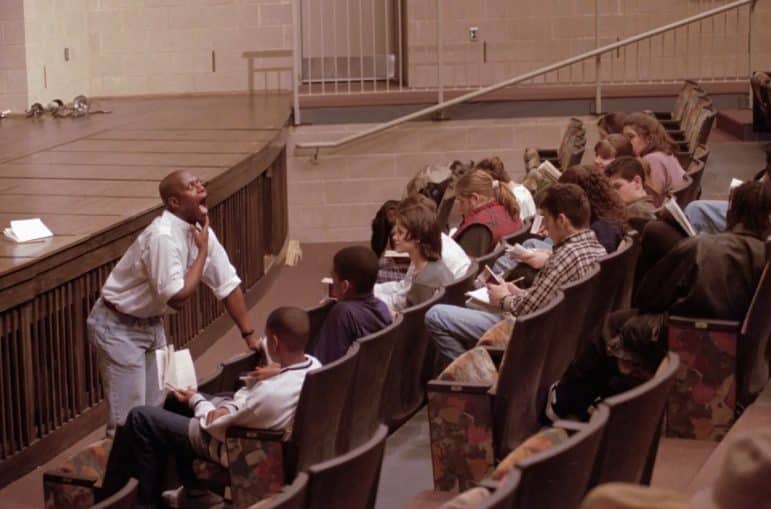
In the 1990s, Braugher held an acting workshop in Baltimore, MD when he was acting on Homicide: Life on the Street.
Offstage during the filming of “Homicide,” he and Brabson lived in Baltimore, embracing the city as the background of the series that launched his career on a much larger scale. He offered acting workshops to high schools there and gave credit to the city during his acceptance speech for his Emmy award for lead actor in a drama series in 1998. “This is for all the people in Baltimore,” he said. “This is a town that I love. We have finally made it.”
Even though his work often filmed in California, he and Brabson raised their sons Michael, Isaiah, and John Wesley in South Orange. “I’ve had a houseful of young boys and there’s a lot of work to be done, and dad is not a psycho killer, he’s not a cop, he’s not a judge, he’s not a lawyer, he’s not a doctor … he’s just dad,” Braugher told The Village Green. “From my perspective I may superficially appear to have it all, but if I’m not there to watch my kids grow up and create memories … then that’s hard.”
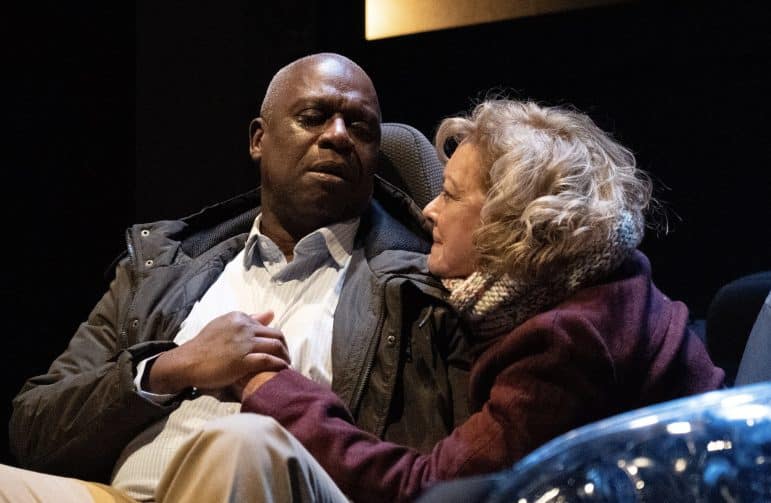
Two-time Emmy Award-winner Andre Braugher and Tony Award-winner Michele Pawk starred in this compelling World Premiere Drama about a professor and a poet, whose marriage is shaken when tragedy strikes. (Photo credit: Lianne Schoenwiesner, Spotlights Photography)
Braugher has been an immense supporter of his wife’s career as both an actress and playwright. He lauded her acting in the 2014 New York premiere of Oni Faida Lampley’s play “Tough Titty.” Brabson played the role of Angela, a lactating mother who discovers she has breast cancer. In late 2017, she performed “Phenomenal Women,” a one-woman show at Luna Stage in West Orange. “I’m her all-around factotum. I’m her sounding board and I’m her roadie,” he told the Village Green.
When Alan Sepinwall interviewed Braugher for Rolling Stone, he commented, “The part that stayed with me wasn’t about Andre Braugher, world-class thespian, but rather when he talked about how he had worked out to a science how to maximize time with Brabson and the kids, despite working 3,000 miles away from them.”
While Braugher’s opportunities and offers continued to grow, the actor picked his projects carefully. “When I came up in the 80s, there were very few positive black roles for actors. Period. And part of what was happening to me in the 80s and the 90s is I was just turning down stuff,” he told The Village Green. “And if I wanted to work more, I wasn’t in a position to turn anything down. But I just wanted my mother and father to be proud of me. There was a huge run of gangster films and crack stories … [but] I just personally couldn’t be involved because the storytelling wasn’t humane enough.”
Braugher played the titular role in “The Court-Martial of Jackie Robinson” (1990), as well as roles in Spike Lee’s “Get on the Bus” (1996), and won a second Emmy award for his role in a 2006 FX mini-series called “Thief,” set in a post-Katrina New Orleans. In “She Said” (2022), he played Dean Baquet, a former executive editor of The New York Times.
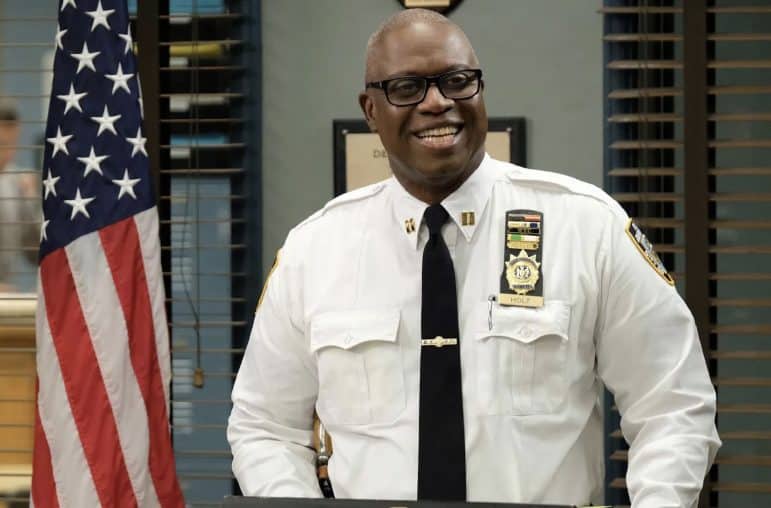
Andre Braugher as Captain Raymond Holt in Brooklyn 99.
Over the last decade, he gained an even larger audience playing the role of Captain Raymond Holt for eight seasons on the police workplace comedy “Brooklyn Nine-Nine,” playing opposite Andy Samberg and an ensemble of gifted comedians. Initially, he expressed concern that he would not fit in with the rest of the cast. “He would have you believe he had [no comedic skills] before the show started, but we all know that’s not true,” said Samberg.
Braugher’s Holt was a fastidious and dour captain in the acclaimed police sitcom. His work was also notable for subverting gay stereotypes. He told the New York Times that one of his sons said to him: “You’re playing a gay police captain?” “I said ‘No, I’m playing the police captain who’s gay.’ So we have to sit down and understand what that distinction is.” Braugher became a linchpin in the series, and fans of his previous work were enamored with his work in comedy.
“Not many people are going to agree with me, but ‘Homicide’ was a comedy too,” he said. “It was a shoot-’em-up, and there were all these dangerous situations, but at heart I think it was an office comedy. We always came back to the squad, and the relationships were built upon mutual affection. And I always felt that they were comic in tone. […] I don’t want to go way out on a limb about this, you know what I’m saying, and be challenged about it. But I think they’re both workplace comedies. In essence it’s taken 20 years to come full circle, but I think they’re in the same place.”
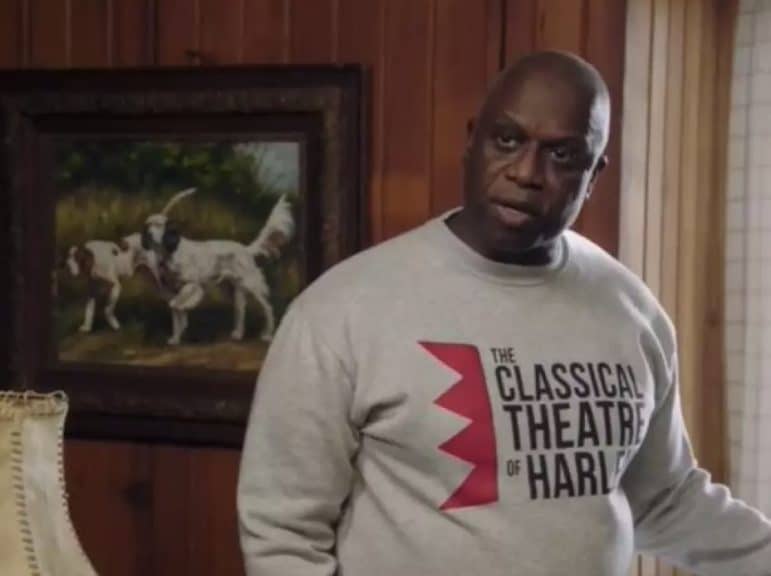
In Season 8, Episode 2 of Brooklyn Nine-Nine, Braugher’s Captain Holt wears a Classic Theatre of Harlem sweatshirt. In real life, Braugher served on CTH’s board.
Throughout his success on screens big and small, he did not lose track of his love for the theater. Braugher served on the board and as a trustee of the Classical Theatre of Harlem, an off-Broadway company that formed in 1999. And in an homage to the theatre company, he wore a Classical Theatre of Harlem sweatshirt in an episode during the final season of “Brooklyn Nine-Nine.” After his death, Braugher’s family shared his desire to have fans donate to Classical Theatre of Harlem, which performs free Shakespeare in Harlem’s Marcus Garvey Park.
Braugher’s death propelled an outpouring of tributes from his close collaborators and colleagues spanning his career in stage, film, and television. “You showed me what a life well lived looks like,” said “Brooklyn Nine-Nine” actor Terry Crews. “He’s a force of intellectual nature,” said David Simon, author of “Homicide: A Year On the Killing Streets” – the book which served as material for the tv series. “I’ve worked with a lot of wonderful actors. I’ll never work with one better.”

